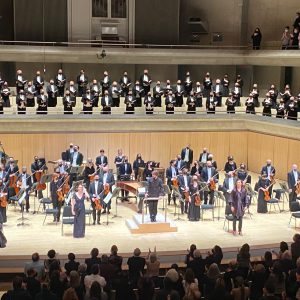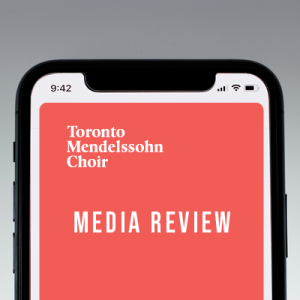Leslie Barcza, barczablog December 17, 2021 Tonight was the first of several TSO Messiahs to be heard at Roy Thomson Hall featuring the Mendelssohn Choir, Conductor Simon Rivard, and four terrific young soloists. This 85 minute version is the latest in a series of adaptations to the new normal. Chorus and orchestra, except for the...
Tag: Handel
TSO Messiah via Mozart
Leslie Barcza, barczablog.
Tonight I heard something different from the Toronto Symphony.
The TSO’s annual Messiah in Roy Thomson Hall with the Toronto Mendelssohn Choir may seem like a ritual, but it actually varies from year to year.
Every time we get different soloists; more on that in a moment.
And some years they vary the actual musical score that’s being played. Handel’s Messiah has been presented in many versions, using many performance philosophies even if you don’t go for something radical like Soundstreams’ “Electric Messiah” or Andrew Davis’s muscular re-orchestration that’s been done a few times at the TSO.
This year we’re hearing Mozart’s take on Messiah.
Toronto Symphony Orchestra’s Mozartian Messiah Is A Unique Experience
Joseph So, Ludwig van Toronto. While one could quibble with the musical structure of the Mozartian version, it remains enjoyable, to be sure. Alexander Shelley made an auspicious TSO debut, leading the orchestra in a very crisp reading of the score. He’s a fine conductor, and let’s hope he’ll be back. His fast tempo, together with the cuts in this version, means that the performance only lasted two and a half hours including intermission. ... And, one can count on the Toronto Mendelssohn Choir to deliver each and every time. It was at its best in “Surely, He hath borne our griefs,” offering up thrilling tone and impressive power.
‘Messiah’ gets a Mozart makeover from the Toronto Symphony Orchestra
John Terauds, Toronto Star. The TSO is not presenting George Frideric Handel’s original 1741 “Messiah,” but Mozart’s 1789 version. Not only that, but the TSO’s five performance will be led by Alexander Shelley, the exciting National Arts Centre Orchestra music director, and sung by a dream team of Canadian operatic soloists: soprano Jane Archibald, mezzo Emily D’Angelo, tenor Isaiah Bell and baritone Russell Braun. As usual, the choral parts will be sung by the Toronto Mendelssohn Choir.
The Trombone Shall Sound? Mozart’s Handel’s Messiah: An Orchestra Librarian’s Nightmare
Gary Corrin, The Wholenote. For many North American orchestras, playing in the pit for ballet performances of Tchaikovsky’s Nutcracker is a common holiday tradition. This was my experience, first as a clarinetist and then as an orchestra librarian. My first encounter with Messiah as a professional, however, was during my interview for the librarian position of the Phoenix Symphony when I was asked, “What edition do you like for the Messiah?” It is an extraordinarily complex question – much more so than I would have known at the time. I managed to offer up something I’d learned from a couple of sing-along Messiahs I had attended – the organizer cautioning the audience/performers about the different numbering systems in various publications. But over the succeeding 30 years I have learned that there is much more to it than that, as I hope to share with you in this article.
Hallelujah! Handel’s Messiah still has special quality for choristers decades later
Michael Swan, The Catholic Register. When Susan Worthington gets home from “Messiah” rehearsals with the Toronto Mendelssohn Choir she’s hungry and tired, but her brain is still full of music.
“You can’t go to bed right away,” she said. “Rehearsals can be incredibly inspiring. We can work very hard. Working hard is good for you.” An alto who takes pride in singing the difficult parts that fall between soaring sopranos with the tune and booming basses who lay down the foundation, Worthington has been singing “Messiah” with Toronto’s oldest and biggest concert choir since the 1980s. She will be on stage at Roy Thomson Hall once again this Advent season for another performance of the iconic oratorio with Mozart’s orchestration. Performances are scheduled for Dec. 17-18-20-21-22. “The experience can be different every single year, but it still has the same kernel of inspiration that speaks to our hearts and, for me personally, to my soul,” Worthington said.
Toronto Mendelssohn Choir’s Haydn and Handel celebration lifts the spirits on a blustery winter night!
Dave Richards, Toronto Concert Reviews. It was a miserable night to trudge downtown. The six or more inches of snow and slush were enough to discourage many from heading out. By mid-afternoon in Oakville when I learned that the GO trains would be cancelled for several hours, my own attendance was put in doubt. But for those of us who did brave the weather to St. Andrew’s Church, The Toronto Mendelssohn Choir and their Interim Conductor and Artistic Director David Fallis made it more than worth our effort with a celebration of Haydn and Handel.
Conductor David Fallis to lead Toronto Mendelssohn Choir, orchestra and stellar soloists in Haydn’s Missa in tempore belli and Handel’s Coronation Anthems
Conductor David Fallis has put together a stellar group of soloists for this concert of two beloved 18th century greats on February 27, 2019. The Choir and orchestra will be joined by soprano Mireille Asselin, mezzo-soprano Christina Stelmacovich, tenor Asitha Tennekoon, and bass-baritone Stephen Hegedus.
Of the Missa in tempore belli, David writes in the program notes:
“The mass has many extraordinary touches. The overall feel is optimistic and confident, appropriate to the basic key of C major, but the beautiful cello and bass singer duet at the Qui tollis in the “Gloria”, the deeply moving Et incarnatus est in the “Credo” and the gorgeous harmonic colouring at so many moments mark this mass as the work of a great composer working at the height of his powers.”
Program Notes: Handel and Haydn, February 2019
Haydn's Missa in tempore belli (Mass in time of war) is so called because it was written in 1796-97 as Napoleon’s forces were advancing towards Vienna. In German-speaking countries it is often referred to as the Paukenmesse (Timpani Mass): the timpani does play a significant part in the mass, especially in the Agnus Dei where Haydn uses a brilliant drum solo to heighten the intensity of the movement’s prayer for mercy and peace.
The mass has many extraordinary touches. The overall feel is optimistic and confident, appropriate to the basic key of C major, but the beautiful cello and bass singer duet at the Qui tollis in the “Gloria”, the deeply moving Et incarnatus est in the “Credo” and the gorgeous harmonic colouring at so many moments mark this mass as the work of a great composer working at the height of his powers.




